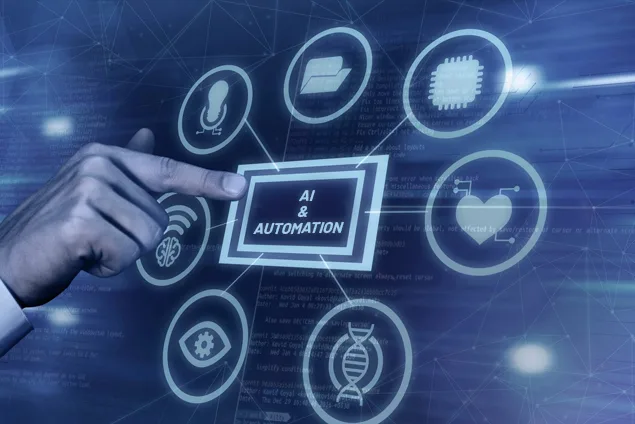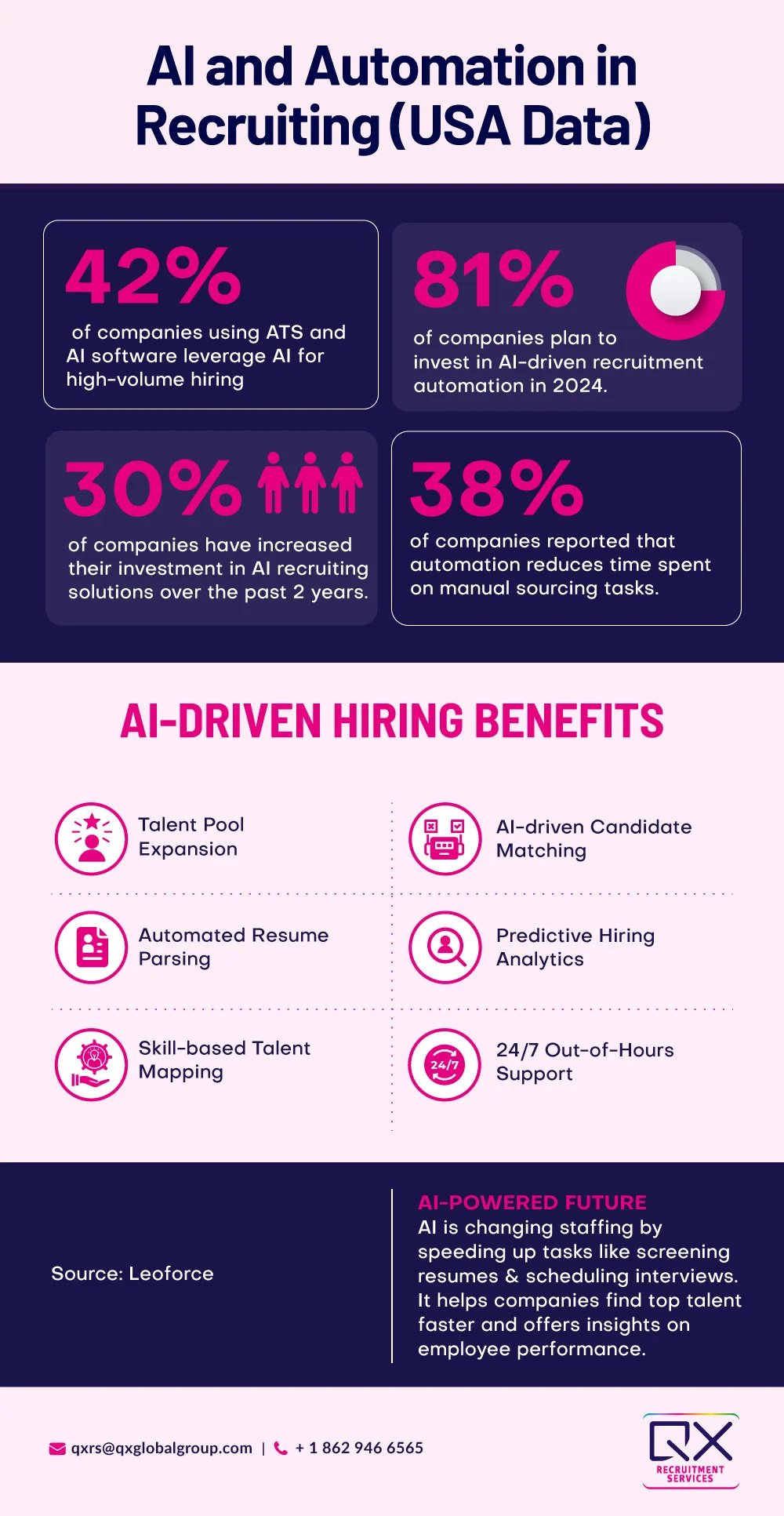Topics: AI & Automation in Staffing, AI Automation, AI in Recruitment
How AI and Automation in Staffing Can 10X Your Revenue!
Posted on September 12, 2024
Written By Ranjana Singh

Around 83% of employers, including 99% of Fortune 500 companies, already use automation in their hiring. But what about healthcare staffing firms, where the stakes are high and demand is growing faster than ever?
The pressure to meet staffing needs, control costs, and increase revenue can feel overwhelming. That’s where the powerful blend of AI and Automation in Staffing with the expertise of human recruiters comes in. This blend isn’t just about saving time; it’s about improving accuracy, enhancing candidate experiences, and boosting ROI.
In this blog, we’ll break down how AI-driven recruitment solutions are transforming healthcare staffing and why Human-AI collaboration in staffing is the key to future growth. Let’s dive in!
How Can AI and Automation in Staffing Improve Efficiency?

The integration of AI-driven recruitment solutions is revolutionizing healthcare staffing. AI algorithms can be sorted through vast amounts of candidate data in seconds, matching the right talent to the right roles faster than any human recruiter could. Some specific ways AI and Automation can help staffing firms:
1. By automating repetitive tasks such as resume screening and interview scheduling, recruitment teams can focus on more strategic activities, thereby enhancing overall productivity.
2. Key automation technologies in staffing include applicant tracking systems (ATS) powered by AI, chatbots for initial candidate engagement, and AI-based background checks. These tools save time and eliminate manual errors, allowing recruitment teams to increase placement rates and reduce time-to-fill.
3. Recruiters spend a substantial amount of time searching for candidates and culling through hundreds of resumes. By leveraging AI, recruiters and staffing firms alike can quickly source the best candidates without wasting time performing repetitive, administrative tasks such as reviewing resumes or setting up candidate meetings.
4. It takes time to write job descriptions that get the attention of candidates and while also adhering to the patchwork of salary disclosures and other requirements. Generative AI products can assist with the development of engaging job descriptions – at least solid first drafts – that will give you a head start to focus on legal compliance.
5. AI-fueled “smart” chatbots can answer questions about the job or application process and provide candidates with immediate help at any time.
6. When used correctly, generative AI can also reduce instances of bias. For example, assisting in identifying the sorts of masculine-leaning terms in a job description that may dissuade women from applying (e.g., “driven,” “objective,” “determined,” etc.). These objective mechanisms will enable staffing agencies to increase diversity hiring goals.
7. AI can also use predictive analytics to analyze candidate data, resumes, social media, online behavior, and other data sources to predict which candidates are most likely to be successful in the role.
8. The technology can also broaden the talent pool by identifying potential candidates who may not have applied to the job or who didn’t use the “right” keywords in their resumes but have the requisite skills and qualifications – and even make first contact with hidden gems.
The Role of Human Expertise in Recruitment Outsourcing
While automation in recruitment outsourcing is invaluable, human intuition, emotional intelligence, and negotiation skills are still indispensable. Healthcare staffing involves working with people, and recruiters excel in understanding the nuances of candidate motivations and client expectations.
The key lies in Human-AI collaboration in staffing, where technology handles data-driven tasks, and human recruiters focus on building relationships, conducting interviews, and negotiating offers. This combination enables staffing firms to scale operations while maintaining personalized service, which ultimately drives client satisfaction and revenue growth.
Driving Staffing Revenue with QX’s AI and Automation Solutions
QX Global Group is the go-to partner for 6 out of 10 healthcare staffing companies, and there’s a reason for that. By blending human expertise with automation, QX helped create a compliant talent pool of 450 nurses and 232 doctors in just 12 months! Plus, with QX’s smart outsourcing solutions, you can cut operational costs by up to 70%.
Outsourcing not only gives you access to a broader talent pool, but it also shortens time-to-fill rates. Faster placements lead to higher client satisfaction and more repeat business, which means more revenue. By leveraging the right mix of staffing technology and human expertise, your firm can handle more job orders and grow your client base—all without increasing headcount.
Frequently Asked Questions (FAQs)
1. How does AI help streamline recruitment processes?
AI automates repetitive tasks like resume screening, interview scheduling, and initial candidate assessments, saving recruiters time and reducing errors.
2. What role do human recruiters play in AI-powered staffing?
Human recruiters use their intuition and expertise to build relationships, conduct interviews, and negotiate offers, tasks that require a human touch.
3. Can AI and automation really increase revenue for healthcare staffing firms?
Yes, by speeding up placements, improving operational efficiency, and reducing costs, AI and automation can significantly boost a firm’s revenue.
4. What are the key benefits of blending AI with human skills in staffing?
The blend allows for faster placements, more accurate candidate matching, and enhanced client satisfaction, leading to sustainable business growth.
5. Are AI-driven recruitment solutions safe and reliable?
Yes, AI tools used in staffing are reliable, secure, and designed to work alongside human recruiters to enhance, not replace, their expertise.
Book a Free Consultation
Enjoyed our blog? Discover more about how our recruitment outsourcing process can slash your costs by up to 60%! Take the next step—book a call by entering your details.
Originally published Sep 12, 2024 09:09:54, updated Jan 14 2025
Topics: AI & Automation in Staffing, AI Automation, AI in Recruitment







